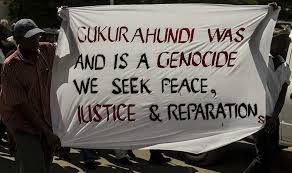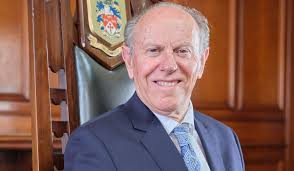A QUARTER of a century after the fast-track land reform programme, the Zimbabwean government is in a disguised consolidation and remaking of a concrete and permanent political “establishment”.
The concept of the “establishment” is well enunciated by British socialist writer, Owen Jones, in his book The Establishment.
This is a book that talks about the people behind the power in Britain and how they exercise power to their favour.
Jones argues that “the establishment” in Britain comprise the land owners, industrialists, media executives, non-governmental organisations (NGOs) and long-serving bureaucrats.
He went to the extent of coining other terms about the relationship between and among the establishment — the revolving door and socialism for the rich.
It is important to explain the two aforementioned terms.
Keep Reading
- Govt justifies clampdown on NGOs
- Crackdown on NGOs derails re-engagement efforts
- Go to hell, Zanu PF tells US, NGOs
- Anti-PVOs Bill solidarity riles govt
The “revolving door” refers to the ease with which people in the “establishment” can move from media to NGOs to government in any order.
On the other hand, “socialism for the rich” refers to those in the establishment benefiting from public resources at the expense of the majority by their own policies like privatisation of State assets.
This phenomenon is not unique to Britain, it is also in the United States, where the establishment is made up of the military industrial complex.
In Africa, while it may not be clear, we have seen the development of dynasties.
However, I argue that South Africa’s African National Congress soon after independence in 1994 worked on refashioning a new establishment through black economic empowerment policy.
In the past, South Africa’s establishment was made of the Afrikaner Broderbond — a conglomerate of Afrikaner landowners, mining magnates, industrialists, media owners.
This was the same in colonial Zimbabwe, where the landowners, miners and industrialists made up the Rhodesian establishment. However, farmers were the dominant group.
Nearly half a century after independence in 1980 and 25 years after the fast-track land reform, Zanu PF has finally decided to concretise the Zimbabwe establishment.
It has been a public secret that the military/deep State were the establishment locally, but they did not individually own mines nor land.
So, their power was only exercised when they remained State employees.
Zimbabwe’s political elite at last seems to have learnt something from Frantz Fanon’s The Wretched of the Earth the need for independent African states to develop national bourgeoisie.
The bourgeois comprises landowners, manufacturers/industrialists and mining conglomerates — men and women whose loyalty is to the new independent States.
The Cabinet on Tuesday revealed a new land tenure policy.
It said: “All land held by beneficiaries of the land reform programme under 99-year leases, offer letters and permits, will now be held under a bankable, registrable and transferable more secure document of tenure, to be issued by the Government of Zimbabwe to beneficiaries.”
It has to be said, this is a small group of people consisting of war veterans, senior military commanders and senior civil servants.
They don’t count to 10 000 at most.
The Cabinet argued: “As such, beneficiaries of the land reform programme will now have enhanced security of tenure to the land they legitimately hold” and “priority will be given to our veterans of the liberation struggle, youths and women.”
It further argued the policy was informed by: “The threat to land tenure, especially to successors entitled to land held by beneficiaries of the land reform programme (such as children of war veterans) arising from inheritance and fraudulent succession issues.”
Bingo! There it is in black and white the policy is primarily to secure the interests of 10 000 war veterans and the Zanu PF honchos who have 99-year leases ahead of all the 340 000 beneficiaries of the land reform programme.
If you read the above paragraph carefully, you will see it is a policy intended for the 10 000 or so new class the establishment.
Let me turn back to Jones’ thesis on “socialism for the rich” and the “revolving door”.
Socialism for the rich is a term that refers to rich people, the elite or big companies getting State assistance to get by when things are bad.
This was exemplified by the 2008/9 global recession when governments in Europe and the United States bailed out banks and other big manufacturing companies using State resources.
The argument was the companies were “too big to fail”.
It should be remembered that the same recession hit poor households hard and some lost their homes because they could not finance their mortgages.
The State did not help the poor, but it had resources for the rich.
In Zimbabwe, all the farmers who applied for A1 resettlement said they had resources to do commercial farming.
However, this was a smokescreen. It is evident they benefited from State programmes.
It is an open secret that these purported “big farmers” received inputs such as seed, diesel and fertilisers and capital equipment such as tractors, combine harvesters, boomsprays, trailers, ploughs and disc harrows, among other things supposedly as loans, but they never repaid.
The government has over the years refused to reveal the names of the beneficiaries of these programmes or how much each individual farmer owes the State.
Cabinet feebly said: “There have been varying levels of accountability from the farmers, with a significant proportion of farmers feeling no obligation to pay back loans advanced. Consequently, the Government has remained saddled with debt emanating from unpaid agricultural loans by many farmers.”
We also know that most of the politicians now in Parliament are beneficiaries of the State largesse.
Most can today safely move from military to Parliament to farming and back into government through the revolving door. And their children too. They are now the de facto ruling class.
It is in this light that while giving security of tenure to 99-year lease holders could be noble, why not to every beneficiary?
Why should the political heavyweights continue to make money from public resources and leave the poor and the working class to carry the can?
Land audits should be made public.
We need to know who got what and if their farms meet the maximum farm sizes defined in law at the moment.
Anything else short stinks to high heavens and should be resisted.
I’m out.





